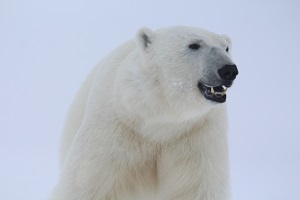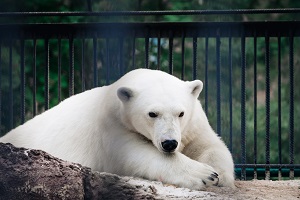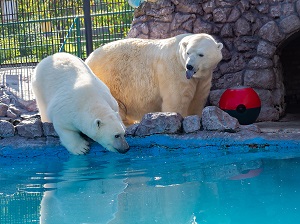Please activate JavaScript in your browser to use all interface options.
Rosneft has been guarding polar bears for 10 years
27 February 2023
The International Polar Bear Day is annually celebrated on the 27th of February. Preservation of the population of this polar dweller is one of the main priorities of Rosneft's environmental program.
Since 2013, Rosneft has been patronizing all polar bears in Russian zoos. To date, the Company maintains 35 polar bears in 17 zoos across the country, providing funds for full feeding, care, treatment, renovation of enclosures, as well as scientific research and educational programs.
Since 2014, the Arctic Research Centre (the Company's corporate research and design institute) has organized more than 40 comprehensive expeditions, during which polar bears, among others, have been studied in the waters of Russia's northern seas.
More than 120 hours of aerial surveys have been conducted, during which scientists have registered both single animals and groups of several polar bears over 500 times; dozens of animals have been examined in detail and tagged with radio transmitters; over 500 biological samples have been collected and analyzed in the laboratory; and the total timekeeping of satellite observations currently stands at over 3,000 days.
This information is extremely important for further studies of the region, since the bear is one of the bioindicator species of northern ecosystems, just like the reindeer, walrus, and white gull, which Rosneft is studying.
 The results of our research have been published in leading scientific journals, including the Ecological Atlases of the Seas of Russia series, published jointly with Innopraktika.
The results of our research have been published in leading scientific journals, including the Ecological Atlases of the Seas of Russia series, published jointly with Innopraktika.
The Company also implements a comprehensive program to support and protect polar bears that find themselves in difficult situations. Since 2016, the Company has already helped to save six orphaned cubs in the Russian Arctic sector.
Rosneft is committed to the policy of preserving wild animals in the wild, so new polar bears appear in zoos only through the birth of babies from those already kept there, or as a result of a rescue operation when the animal's life is in real danger.
Last year, Rosneft and the Moscow Zoo launched a social and cultural educational project "Polar Bears in Nature and in Captivity". Zoo staff help students develop an understanding of ecological relationships and the importance of caring for polar bears and other species.
 During 2022, a number of zoos performed extensive construction work on sites housing polar bears. The aviaries and pools in the Yekaterinburg Zoo, Seversky Nature Park (Tomsk Region), and the Roev Ruchei Krasnoyarsk Park of Flora and Fauna were significantly expanded. Four more zoos - Novosibirsk, Leningrad, Udmurt and Yakutia - had their enclosures and technical rooms repaired last year.
During 2022, a number of zoos performed extensive construction work on sites housing polar bears. The aviaries and pools in the Yekaterinburg Zoo, Seversky Nature Park (Tomsk Region), and the Roev Ruchei Krasnoyarsk Park of Flora and Fauna were significantly expanded. Four more zoos - Novosibirsk, Leningrad, Udmurt and Yakutia - had their enclosures and technical rooms repaired last year.
Note for Editors:
The following are some facts about the polar bear:
- The polar bear is the largest terrestrial predator on the planet. Their weight averages 350 - 450 kg, body length is up to 2.5 m, but there are individuals who grow up to 3 m and fatten up to 800 kg!
- Polar bear's fur is not white but transparent, a hair is hollow and filled with air what helps the animals to save heat better. The skin under the fur is black, and the bear's tongue is blue.
- The newborn cubs are about the size of a guinea pig. The cubs stay with their mother for about two years, during which time they learn the skills necessary to survive in the Arctic.
- Polar bears are among the most voracious zoo inhabitants. In 2022 they ate a total of 143.5 tons of food, including: 49218 kg of meat, 46324 kg of fish, 14763 kg of vegetables and greens, 16114 kg of fruit, 17103 kg of bread and cereals. The good appetite is one indication that Rosneft's patronized zoo animals are doing well. There are two other important indicators - life span and the birth of offspring.
- The oldest polar bear in Russia lives in Seversky Nature Park (Tomsk region). The bear named Ood is 32 years old. Polar bears do not live to this age in the wild. And the youngest ones recently turned 2 months old. Two cubs were born in the Novosibirsk zoo on December 16, 2022. Kai and Gerda, longtime Rosneft wards, became parents for the fourth time.
Rosneft
Information Division
February 27, 2023

-315xx70.png)

